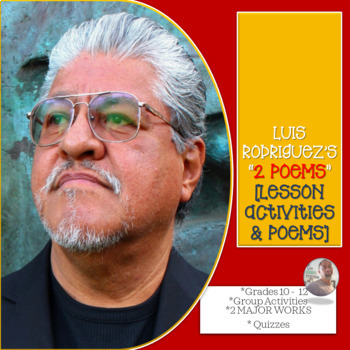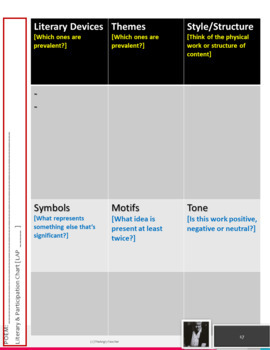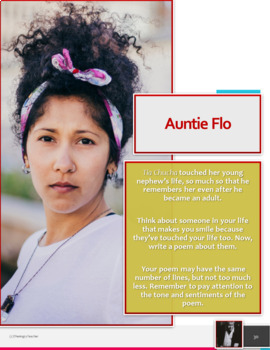LUIS RODRIGUEZ'S "2 POEMS" [Lesson Activities & Poems]
- PDF
Description
This Luis Rodriguez "2 Poems" [Lesson Activities and Poems] product provides students a chance to experience a variety of topics that cause reflection. 2 of Rodriguez's popular poems, 18 discussion questions/essay prompts, a sample LITERARY & ANALYSIS Chart, LESSON ACTIVITIES, Black & White Versions, quizzes, and a Biography. These poems allow students to read and analyze these poems of literary merit. 9th - 12th Graders will love this product. Check it out!
Summary:
In 1954, Luis J. Rodríguez was born in El Paso, Texas. He grew up in Watts and the East Los Angeles area, where his family faced poverty and discrimination. A gang member and drug user at the age of twelve, by the time he turned eighteen, Rodríguez had lost twenty-five of his friends to gang violence, drug overdoses, shootings, and suicide. He wrote two autobiographical accounts of his experiences with gang violence and addiction, It Calls You Back: An Odyssey Through Love, Addiction, Revolutions, and Healing (Touchstone, 2012), winner of the National Book Critics Circle Award for Autobiography, and Always Running: La Vida Loca, Gang Days in L.A. (Curbstone Books, 1993), winner of the Carl Sandburg Award of the Friends of the Chicago Public Library.
This 9th - 12th grade canonized set of poems allows students to understand life and love and the need to reflect.
Poems Included:
1. "Love Poem to Los Angeles"
2. "Tia Chucha"
This Product Includes:
1. Who is Luis Rodriguez? Written/Video Biography
2. Each poem has 5 - 8 Discussion Questions [24 questions]
3. Rodriguez Visual Poetry
4. Literary and Participation Chart [Blank & Printable]
5. Group Poem Presentations
6. Talking Back and much more
You may also appreciate:
A.K. Ramanujan's "3 Poems" [LESSON ACTIVITIES & POEMS]
Letitia Elizabeth Landon's "4 Poems" [LESSON ACTIVITIES & POEMS]
William Wordsworth's "2 Poems" [LESSON ACTIVITIES & ...
Langston Hughes' "2 Poems" [Mini-Bundle]
Marge Piercy's "6 POEMS" [Lesson Activities & Poem ...
Li-Young Lee's "6 Poems" [LESSON ACTIVITIES & POEMS]
FIND ME ON THESE SOCIAL MEDIA PLATFORMS:
Hey guys,
I'm Richard Williams, The Angry Teacher. I've been teaching for 18+ Years , and have amassed quite a bit of knowledge to share. Please consider joining the Angry Teacher family; we'll enjoy having you in the fam!
Please consider checking out the other short story materials and resources in my store.
Also, guys, remember that leaving REVIEWS is a way that TpT gives you credit on products! So let's do it!
Thanks for stopping by!





